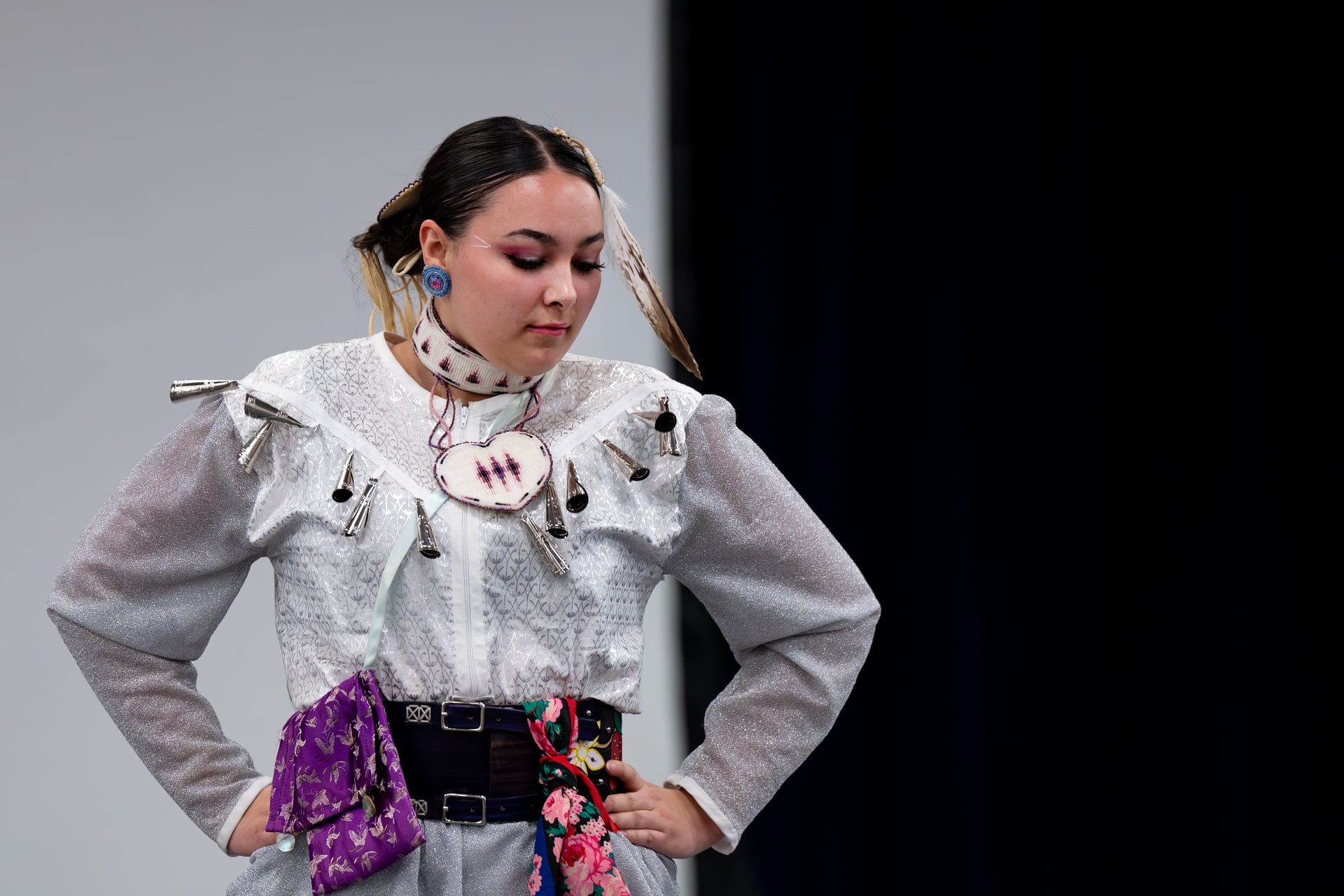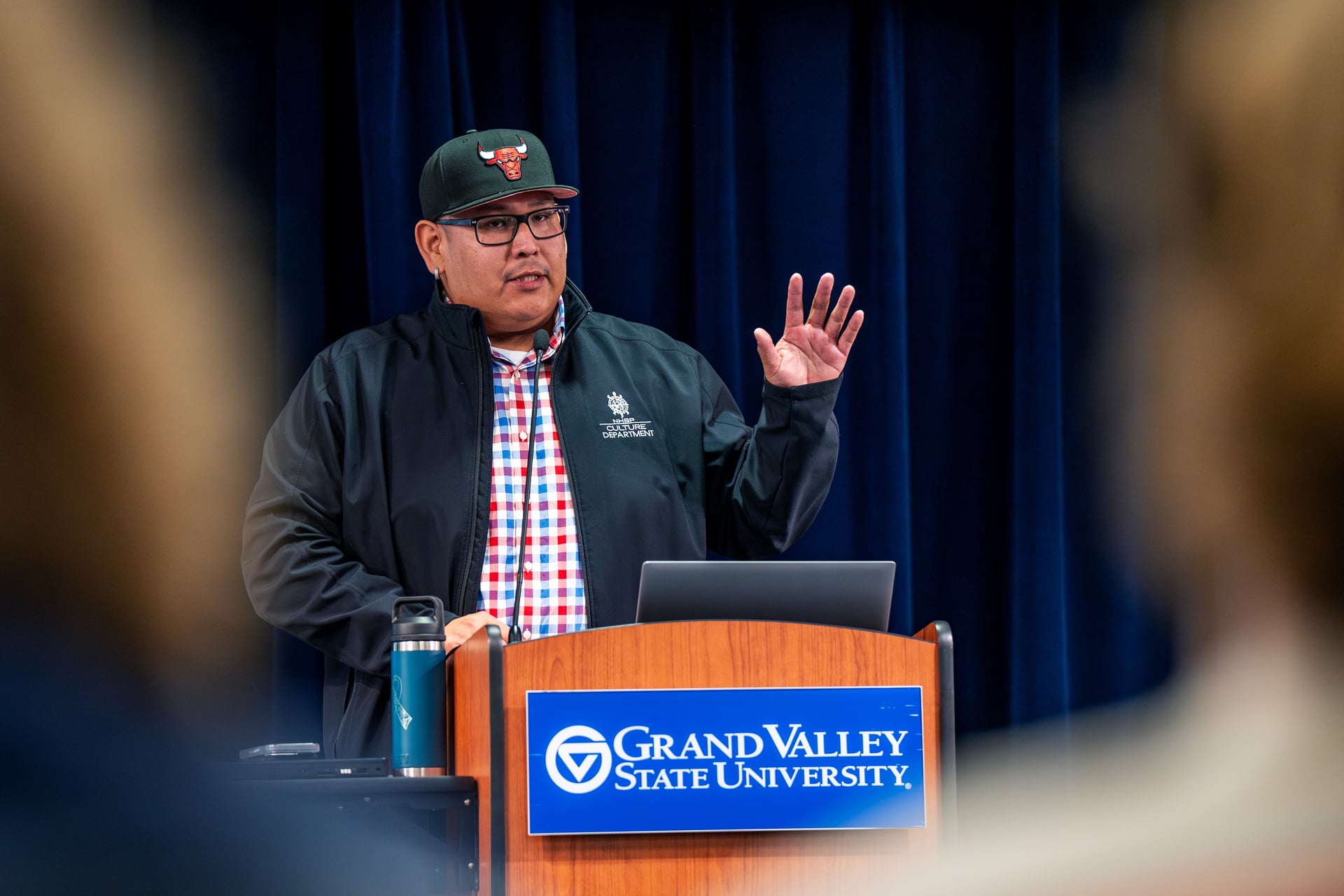
- Details
- By Levi Rickert
ALLENDALE, Mich. — Mike Medawis, language coordinator at Nottawaseppi Huron Band of the Potawatomi, told an audience of students and faculty at Grand Valley State University (GVSU) that tribal languages are in a state of emergency. He added if we do not act they may become extinct.
Medawis spoke at GVSU on Wednesday for the “Indigi-Fest: All About Sovereignty” that was part of the university’s Native American Heritage Month celebration.
“If we lose our language, we will have done what the government failed to do for centuries, to eradicate our language and our way of life as the Creator meant for us,” Medawis, who is Potawatomi, Odawa, and Ho-Chunk. “Our ceremonies are dependent on the use of our language today. Some of our people are confused and have no identity because they do not know our language.”

GVSU’s Indigi-Fest was a day-long event that provided university faculty and students an opportunity to learn about Native American culture, including language preservation that Medawis addressed.
Match-E-Be-Nash-She-Wish Band of Pottawatomi (Gun Lake Tribe) Councilor Ed Pigeon kicked off the day with a presentation on tribal governance utilizing tribal sovereignty.
Other topics included presentations on food sovereignty, decolonizing social work and education, Anishinaabemowin Language, an introduction to powwow, and we finish with a movie and panel discussion on the movie, Two-Spirit Powwow by Rick Bacigalupi.
“The day was filled with learning about Anishinaabe culture and ways of being, allowing for students, faculty, and staff to fully engage with our community’s traditional knowledge keepers. Our NASA and Mno’Chigewin students pulled together to create this inclusive space where all felt comfortable to be, we tried to create that welcoming feeling that I get when I’m in community, Belinda (Lin) Bardwell (Little Traverse Bay Bands of Odawa Indians), GVSU’s senior advisor on Native American Affairs and assistant director of Office of Multicultural Affairs, said.
https://nativenewsonline.net/education/gvsu-s-indigi-fest-emphasized-sovereignty-andculture-during-native-american-heritage-month-celebration#sigProIdb22494f3f3
Before the movie was shown, there was a powwow demonstration which highlighted the different styles of dance seen at powwows including Men’s and Women’s Traditional, Fancy Shawl, and Jingle.
Each of the four dancers representing the different styles of dance spoke about what powwow meant to them and explained that hundreds of hours and dollars go into each regalia. Oftentimes, each dancer’s regalia represents what community they come from and represent.
Photos by Cory Morse for Grand Valley State University. Neely Bardwell contributed to this article.
More Stories Like This
10 Years of Building Business Dreams for Indigenous WomenIchigo Foundation Awards American Indian College Fund Adult Education Program
Bard College Center for Indigenous Studies (CfIS) Hosts Annual Symposium With Keynote Speaker Miranda Belarde-Lewis on March 9–10
American Indian College Fund Announces Spring 2026 Faculty Fellow Cohort
Navajo Nation Signs $19 Million Diné Higher Education Grant Fund Act into Law
Help us defend tribal sovereignty.
At Native News Online, our mission is rooted in telling the stories that strengthen sovereignty and uplift Indigenous voices — not just at year’s end, but every single day.
Because of your generosity last year, we were able to keep our reporters on the ground in tribal communities, at national gatherings and in the halls of Congress — covering the issues that matter most to Indian Country: sovereignty, culture, education, health and economic opportunity.
That support sustained us through a tough year in 2025. Now, as we look to the year ahead, we need your help right now to ensure warrior journalism remains strong — reporting that defends tribal sovereignty, amplifies Native truth, and holds power accountable.
 The stakes couldn't be higher. Your support keeps Native voices heard, Native stories told and Native sovereignty defended.
The stakes couldn't be higher. Your support keeps Native voices heard, Native stories told and Native sovereignty defended.
Stand with Warrior Journalism today.
Levi Rickert (Potawatomi), Editor & Publisher



